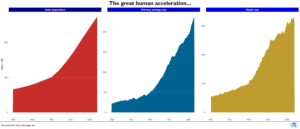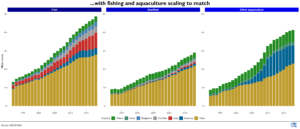Seeing the speed with which mankind is drawing on resources, brings to mind questions of sustainability and eventually the thoughts of economist Thomas Malthus. Essentially, will population expand faster than food supply?
In 1798, Thomas Malthus’ published his “Essay on the Principle of Population”. Wrote that, “Population [growth], when unchecked, increases in a geometrical ratio. Subsistence increases only in an arithmetical ratio”. By his logic, famine was inevitable.
There is more to Malthus’ theory than only the growth rates. Included are undertones of Anglican ideology – assumptions that surpluses would accelerate population growth by encouraging larger families. However, his hypothesis failed to allow for technological developments, which have seen food availability at least match pace with population growth.
A quarter of millennium later, looking at metrics of human growth, begs the questions, “Can food availability keep up with the rate of human acceleration” and “Where are the technological developments and new sources of food?”
Indeed, look at the growth of aquaculture. Whether fish, shellfish or other marine life, production has ramped up rapidly in recent years. This is despite policies implemented to ensure some stocks are not depleted through over fishing. Then there are the opportunities for lab-grown meat as a reliable, viable option for protein.
Analysis from the OECD’s Food and Agriculture Organisation offers reasons to be positive. It published that, “World population is expected to grow from 7.9 billion in 2022 to 8.6 billion people in 2032…an average annual growth rate of 0.8%…compared to the 1.1% per annum rate of the previous decade” – Link. Food production, meanwhile, is expected to grow at 1.1% per annum.
Despite geopolitical stress and climate impacts, the prophecies of Malthus and other economists and those espoused in popular culture, like Soylent Green, have not come to pass, and, we can hope, never will.



